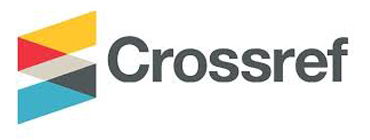THE EFFECTIVENESS OF USING SCATTERGORIES GAMES TOWARDS STUDENTS’ VOCABULARY AT MTs BAHARUDDIN TAPANULI SELATAN
Abstract
This study aims to determine the effect of the scattergories games toward students’ vocabulary observed and conducted at MTs Baharuddin Tapanuli Selatan. This research was conducted using quasi experimental research design. The populations in this research are students of seventh grade MTs Baharuddin Tapanuli Selatan. And the sample of this research was all of the students of second grade MTs Baharuddin because the total number of the population less than 0ne hundred students. In this research, the researcher using scattergories games in experimental class while in controlled class without using scattergories game. In this study, the researcher use pretest, treatment and posttest. Researcher uses SPSS v. 26 to calculate the data. In the posttest of experimental class and controlled class the researcher finds that the sig. (2 tailed) on the t-test 0.00 < 0.05, so there is significant different between controlled class and experimental class. Ha accepted and Ho rejected. It can be conclude that there is an effect towards students’ vocabulary by using scattergories game.
(Key Word: Vocabulary, Scattergories Games)
Full Text:
PDFReferences
Andrew Wright, David Betteridge, Michael Buckby, 2006. Games for Language Learning. UK: Cambridge University Press
Arikunto, Suharsimi. 2002. Prosedur Penelitian Suatu Pendekatan Praktek. Jakarta: PT. Rineka Cipta
Ashwini M. Namasivayam , Kathy Hipfner-Boucher , Trelani Milburn, at al. 2015. Effects of coaching on educators
Bahari, Akbar.2020. Game-based collaborative vocabulary learning in blended and distance L2 learning. The Journal of Open, Distance and e-Learning. Vol.1(3). p.1-22
Bruce A. Thyer. 2012, Quasi- Experimental Research Designs, New York: Oxford University Press
Creswell JW. 2012. Educational Research Planning, Conducting and Evaluating Quantitative and Qualitative Research Fourth Edition. Boston: Pearson Education
Elsa Traganta, Anna Marsola, at al. 2015. Vocabulary learning at primary school: a comparison of EFL and CLIL. International Journal of Bilingual Education and Bilingualism. Vol. 4(3).p.1- 14
Gaims, R and Redman S. 1996. Working With Words: A Guide to Teaching and Learning Vocabulary. Cambridge: Cambridge University
John, Langan. 2002. Reading and Study Skills. New York: Mc Graw-Hill
Nation. I. S. P.1996. Learning Vocabulary in Another Language.UK: Cambridge University Press
Schmitt, Norbert. 2000. Vocabulary in Language Teaching. USA: Cambridge University Press
Scott Thornbury.2002. How to Teach Vocabulary, UK: Pearson Education
Refbacks
- There are currently no refbacks.

This work is licensed under a Creative Commons Attribution-NonCommercial-ShareAlike 4.0 International License.
INDEXING
Bright Vision by UIN Sumatera Utara Medan is licensed under a Creative Commons Attribution-NonCommercial-ShareAlike 4.0 International License.
Based on a work at http://jurnaltarbiyah.uinsu.ac.id/index.php/brightvision.









